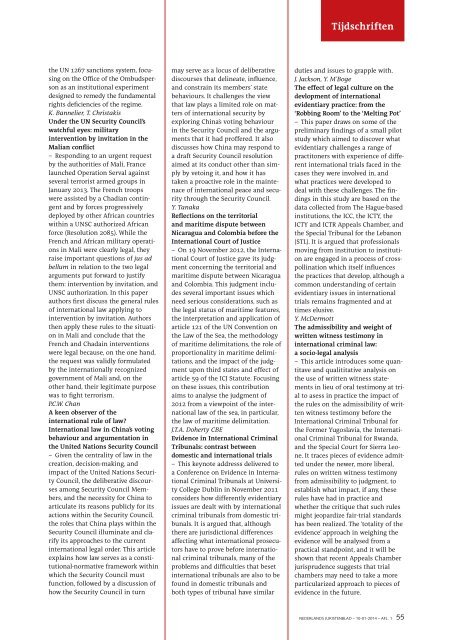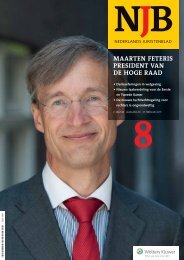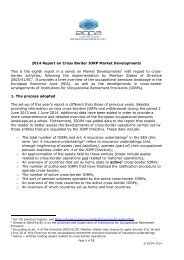NJB-1401
NJB-1401
NJB-1401
You also want an ePaper? Increase the reach of your titles
YUMPU automatically turns print PDFs into web optimized ePapers that Google loves.
Tijdschriftenthe UN 1267 sanctions system, focusingon the Office of the Ombudspersonas an institutional experimentdesigned to remedy the fundamentalrights deficiencies of the regime.K. Bannelier, T. ChristakisUnder the UN Security Council’swatchful eyes: militaryintervention by invitation in theMalian conflict– Responding to an urgent requestby the authorities of Mali, Francelaunched Operation Serval againstseveral terrorist armed groups inJanuary 2013. The French troopswere assisted by a Chadian contingentand by forces progressivelydeployed by other African countrieswithin a UNSC authorized Africanforce (Resolution 2085). While theFrench and African military operationsin Mali were clearly legal, theyraise important questions of jus adbellum in relation to the two legalarguments put forward to justifythem: intervention by invitation, andUNSC authorization. In this paperauthors first discuss the general rulesof international law applying tointervention by invitation. Authorsthen apply these rules to the situationin Mali and conclude that theFrench and Chadain interventionswere legal because, on the one hand,the request was validly formulatedby the internationally recognizedgovernment of Mali and, on theother hand, their legitimate purposewas to fight terrorism.P.C.W. ChanA keen observer of theinternational rule of law?International law in China’s votingbehaviour and argumentation inthe United Nations Security Council– Given the centrality of law in thecreation, decision-making, andimpact of the United Nations SecurityCouncil, the deliberative discoursesamong Security Council Members,and the necessity for China toarticulate its reasons publicly for itsactions within the Security Council,the roles that China plays within theSecurity Council illuminate and clarifyits approaches to the currentinternational legal order. This articleexplains how law serves as a constitutional-normativeframework withinwhich the Security Council mustfunction, followed by a discussion ofhow the Security Council in turnmay serve as a locus of deliberativediscourses that delineate, influence,and constrain its members’ statebehaviours. It challenges the viewthat law plays a limited role on mattersof international security byexploring China’s voting behaviourin the Security Council and the argumentsthat it had proffered. It alsodiscusses how China may respond toa draft Security Council resolutionaimed at its conduct other than simplyby vetoing it, and how it hastaken a proactive role in the maintenaceof international peace and securitythrough the Security Council.Y. TanakaReflections on the territorialand maritime dispute betweenNicaragua and Colombia before theInternational Court of Justice– On 19 November 2012, the InternationalCourt of Justice gave its judgmentconcerning the territorial andmaritime dispute between Nicaraguaand Colombia. This judgment includesseveral important issues whichneed serious considerations, such asthe legal status of maritime features,the interpretation and application ofarticle 121 of the UN Convention onthe Law of the Sea, the methodologyof maritime delimitations, the role ofproportionality in maritime delimitations,and the impact of the judgmentupon third states and effect ofarticle 59 of the ICJ Statute. Focusingon these issues, this contributionaims to analyse the judgment of2012 from a viewpoint of the internationallaw of the sea, in particular,the law of maritime delimitation.J.T.A. Doherty CBEEvidence in International CriminalTribunals: contrast betweendomestic and international trials– This keynote addresss delivered toa Conference on Evidence in InternationalCriminal Tribunals at UniversityCollege Dublin in November 2011considers how differently evidentiaryissues are dealt with by internationalcriminal tribunals from domestic tribunals.It is argued that, althoughthere are jurisdictional differencesaffecting what international prosecutorshave to prove before internationalcriminal tribunals, many of theproblems and difficulties that besetinternational tribunals are also to befound in domestic tribunals andboth types of tribunal have similarduties and issues to grapple with.J. Jackson, Y. M’BogeThe effect of legal culture on thedevlopment of internationalevidentiary practice: from the‘Robbing Room’ to the ‘Melting Pot’– This paper draws on some of thepreliminary findings of a small pilotstudy which aimed to discover whatevidentiary challenges a range ofpractitoners with experience of differentinternational trials faced in thecases they were involved in, andwhat practices were developed todeal with these challenges. The findingsin this study are based on thedata collected from The Hague-basedinstitutions, the ICC, the ICTY, theICTY and ICTR Appeals Chamber, andthe Special Tribunal for the Lebanon(STL). It is argued that professionalsmoving from institution to institutionare engaged in a process of crosspollinationwhich itself influencesthe practices that develop, although acommon understanding of certainevidentiary issues in internationaltrials remains fragmented and attimes elusive.Y. McDermottThe admissibility and weight ofwritten witness testimony ininternational criminal law:a socio-legal analysis– This article introduces some quantitaveand qualititative analysis onthe use of written witness statementsin lieu of oral testimony at trialto asess in practice the impact ofthe rules on the admissibility of writtenwitness testimony before theInternational Criminal Tribunal forthe Former Yugoslavia, the InternationalCriminal Tribunal for Rwanda,and the Special Court for Sierra Leone.It traces pieces of evidence admittedunder the newer, more liberal,rules on written witness testimonyfrom admissibility to judgment, toestablish what impact, if any, theserules have had in practice andwhether the critique that such rulesmight jeopardize fair-trial standardshas been realized. The ‘totality of theevidence’ approach in weighing theevidence will be analysed from apractical standpoint, and it will beshown that recent Appeals Chamberjurisprudence suggests that trialchambers may need to take a moreparticularized approach to pieces ofevidence in the future.NEDERLANDS JURISTENBLAD – 10-01-2014 – AFL. 1 55




